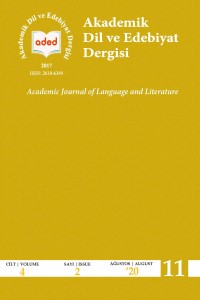Abstract
References
- Djurdjev, Branislav (1992): "Bosna-Hersek", TDV İslâm Ansiklopedisi, https://islamansiklopedisi.org.tr/bosna-hersek
- Duman, Mehmet Âkif (2005): Fâzıl Dîvânı (Transkripsiyonlu Metin- İnceleme), Cumhuriyet Üniversitesi, Sosyal Bilimler Enstitüsü. Basılmamış Yüksek Lisans Tezi. Sivas.
- Duman, M. Akif (2019a). Ziyâ Paşa’nın Siyasi Rakibi Bosnalı Mehmet Fâzıl Paşa’nın Edebî Şahsiyeti ve Divanı’nın Genel Özellikleri. Uluslararası Türkçe Edebiyat Kültür Eğitim Dergisi, 8(2), 805-832.
- Duman, M. Akif (2019b): Bosnalı Mehmet Fâzıl Paşa Dîvânı’nda Sevgiliye Ait Güzellik Unsurları, Akademik Sosyal Araştırmalar Dergisi, Yıl: 7, Sayı: 89, Mart 2019, s. 293-314.
- Duman, M. Akif (2019c): “Sigmund Freud’un Mazmun Anlayışı”, Türk Dili- Dil ve Edebiyat Dergisi, Cilt: CXVI Sayı: 807. Mart 2019. Ankara: TDK, ss.10-27.
- İnal, İbnülemin Mahmut Kemâl (1988): Son Asır Türk Şairleri, C.I, İstanbul: Dergâh Yay.
- Kaplan, Mehmet (1981): Şiir Tahlilleri I (Tanzimat’tan Cumhuriyete Kadar), yedinci baskı. İstanbul: Dergâh.
- Kolcu, Hasan (1988): Zafer-nâme’ye Reddiye ve Tekzibiyye, Türk Dünyâsı Araştırmaları, nr. 54, Haziran 1988, ss. 169-177.
- Kolcu, Hasan (1998): Ziyâ Paşa’nın Zafer-nâme’sine Reddiye ve Tekzibiyye, İstanbul: Can yay.
- London, Jack ([1909]/2017): Martin Eden, çev. Handan Ünlü Haktanır, İstanbul: Koridor.
- Tanpınar, Ahmet Hamdi (1967): 19. Asır Türk Edebiyatı Târihi, İstanbul, ss.279-321.
- Tarlan, Ali Nihat (1963): Necâtî Beg Dîvânı, İstanbul: MEB yay.
- Tarlan, Ali Nihat (1981a): “Metinler Şerhine Dâir”, Edebiyât Meseleleri, İstanbul.
- Tarlan, Ali Nihat (1981b): “Edebiyât Târihi Hakkında”, Edebiyât Meseleleri, İstanbul.
- Ziya Paşa (1869/ 1975): Zafer-nâme, (Hazırlayan: Fikret Şahoğlu), Tercüman 1001 Temel Eser, İstanbul.
Abstract
Bosnian Mehmet Fâzıl Pasha (1799-1882) is a statesman belonging to the Tanzimat Period, where the Ottoman Empire underwent a total change, and a poet who witnessed this age. This versatility, which is seen in many influential personalities, is in the case of Fazil Pasha not in the form of sides moving in different directions, but rather like specifications that merge together. In a more summarized sentence, the Pasha used his poetry skill in favor of his position as a statesman. Fazil Pasha, who was the target of heavy criticism in Zafer-name [Book of Victory ], the famous satire of Ziyâ Pasha, joined this conflict because of him using his poetry skills in that direction. In fact, Fâzıl Pasha was not hostile to Ziyâ Pasha, because the “tarih” with the number 48 in the Divan was written as a congratulation for Ziya Pasha becoming Bosnian supervisor. However, because of his proximity to Ali Pasha and according to Ziya Pasha's conception, allegations of unlawful acquisition of his position, he attacked with serious insults like “clown" or "dog”. Although it was not as much known as the Zafer-name, the Pasha tried to defend himself with Reddiye and Tekzibiyye [Rejection and Refutation]. Fazil Pasha, who was criticized more heavily and especially in terms of his cultural level, should be appreciated at least in terms of witnessing the time he lived in and mastering the mazmun culture, as the “person names” which we will try to examine with this article and which are only one of the features in his Diwan will show. Person names in the Fâzıl Pasha's Diwan are deployed in a very wide area. From the rulers of ancient times, especially the Ottoman sultans and statesmen, to the mythological heroes; from sufis to poets, scholars and philosophers, many well-known people were mentioned in the Diwan.
References
- Djurdjev, Branislav (1992): "Bosna-Hersek", TDV İslâm Ansiklopedisi, https://islamansiklopedisi.org.tr/bosna-hersek
- Duman, Mehmet Âkif (2005): Fâzıl Dîvânı (Transkripsiyonlu Metin- İnceleme), Cumhuriyet Üniversitesi, Sosyal Bilimler Enstitüsü. Basılmamış Yüksek Lisans Tezi. Sivas.
- Duman, M. Akif (2019a). Ziyâ Paşa’nın Siyasi Rakibi Bosnalı Mehmet Fâzıl Paşa’nın Edebî Şahsiyeti ve Divanı’nın Genel Özellikleri. Uluslararası Türkçe Edebiyat Kültür Eğitim Dergisi, 8(2), 805-832.
- Duman, M. Akif (2019b): Bosnalı Mehmet Fâzıl Paşa Dîvânı’nda Sevgiliye Ait Güzellik Unsurları, Akademik Sosyal Araştırmalar Dergisi, Yıl: 7, Sayı: 89, Mart 2019, s. 293-314.
- Duman, M. Akif (2019c): “Sigmund Freud’un Mazmun Anlayışı”, Türk Dili- Dil ve Edebiyat Dergisi, Cilt: CXVI Sayı: 807. Mart 2019. Ankara: TDK, ss.10-27.
- İnal, İbnülemin Mahmut Kemâl (1988): Son Asır Türk Şairleri, C.I, İstanbul: Dergâh Yay.
- Kaplan, Mehmet (1981): Şiir Tahlilleri I (Tanzimat’tan Cumhuriyete Kadar), yedinci baskı. İstanbul: Dergâh.
- Kolcu, Hasan (1988): Zafer-nâme’ye Reddiye ve Tekzibiyye, Türk Dünyâsı Araştırmaları, nr. 54, Haziran 1988, ss. 169-177.
- Kolcu, Hasan (1998): Ziyâ Paşa’nın Zafer-nâme’sine Reddiye ve Tekzibiyye, İstanbul: Can yay.
- London, Jack ([1909]/2017): Martin Eden, çev. Handan Ünlü Haktanır, İstanbul: Koridor.
- Tanpınar, Ahmet Hamdi (1967): 19. Asır Türk Edebiyatı Târihi, İstanbul, ss.279-321.
- Tarlan, Ali Nihat (1963): Necâtî Beg Dîvânı, İstanbul: MEB yay.
- Tarlan, Ali Nihat (1981a): “Metinler Şerhine Dâir”, Edebiyât Meseleleri, İstanbul.
- Tarlan, Ali Nihat (1981b): “Edebiyât Târihi Hakkında”, Edebiyât Meseleleri, İstanbul.
- Ziya Paşa (1869/ 1975): Zafer-nâme, (Hazırlayan: Fikret Şahoğlu), Tercüman 1001 Temel Eser, İstanbul.
Details
| Primary Language | Turkish |
|---|---|
| Subjects | Literary Studies |
| Journal Section | Articles |
| Authors | |
| Publication Date | August 30, 2020 |
| Submission Date | June 2, 2020 |
| Acceptance Date | July 2, 2020 |
| Published in Issue | Year 2020 Volume: 4 Issue: 2 |

